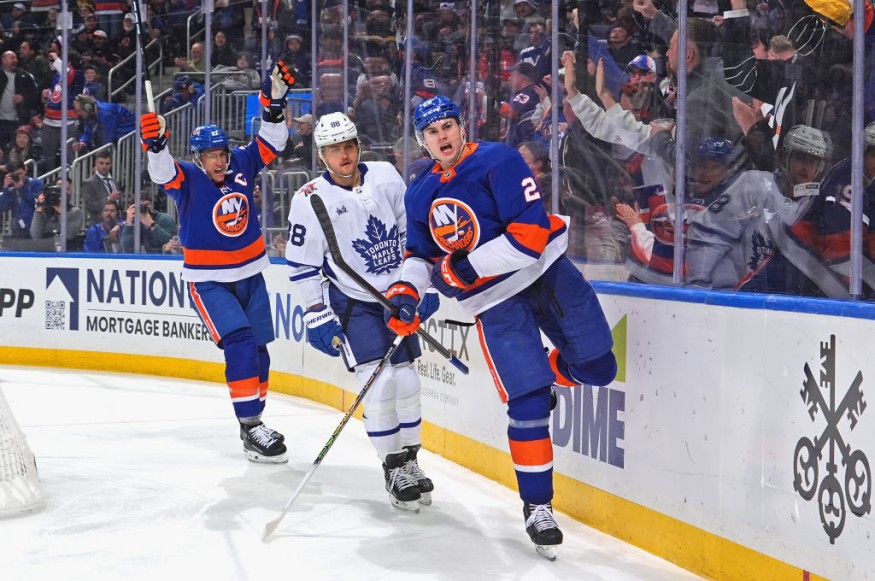
Two weeks ago, the Toronto Maple Leafs and star winger William Nylander agreed to terms on an eight-year, $92 million dollar contract extension that will carry an average annual value of $11.5 million per year.
Eight-figure cap hits are becoming the norm for superstars in the NHL, but usually they are reserved for the top individual player on a given team.
When Nylander's contract kicks in next season, he will be the fourth member of the Toronto Maple Leafs to be earning over $10 million per year, joining centers Auston Matthews ($13.25 million) and John Tavares ($11 million) as well as fellow winger Mitch Marner ($10.903 million).
As things currently stand, there are 16 contracts signed for next season that have cap hits of $10 million or higher. Four belong to Toronto, and only one other team, the Florida Panthers, has more than one. Both of Florida's (Aleksandr Barkov and Sergei Bobrovsky) are at exactly $10 million.
Related Article : Philadelphia Flyers on a Tear After Shocking Trade of Cutter Gauthier
Are the Maple Leafs Getting What They Pay For?
The Maple Leafs have infamously won only one playoff series in what their fans have dubbed the "Core Four" era when they beat the Lightning last season only to lose to the Panthers in five games in the second round.
There is little question that Matthews, Marner, and Nylander have proven to be worth their contracts in terms of what they bring in the regular season, but concentrating so much of the team's salary cap space in to four players has starved what the team is able to build around them, in goal and on defense.
For a group of four players to take up so much cap space would logically require them to be proven as winners when it counts the most.
Instead, Toronto is stuck with a group that has consistently fallen short in the postseason, taking up more and more of the team's resources while the product now struggles in the regular season with lackluster defense and goaltending.
The Flaws in Toronto's Roster Are Showing
After Nylander signed his extension, the Maple Leafs hit a weak point of their schedule, allowing them to pick up two wins over the bottom-feeding San Jose Sharks and another over the weak Anaheim Ducks.
Since then, the schedule has picked up, and the team has faltered in a major way. The Leafs lost on the road in overtime to Tavares's former team the New York Islanders to start a skid. They followed it up with back-to-back losses at home against the Colorado Avalanche and Detroit Red Wings.
Those losses preceded a West Coast road trip that just ended with losses to Edmonton and Vancouver and two wins over Seattle and Calgary.
All in all, the Maple Leafs are 2-4-1 since their schedule picked up. Over the last six weeks, they have just one win over a team currently in a playoff spot.
The reasons for the struggles are fairly clear. Due to the aforementioned cap constraints, the Maple Leafs were only able to devote about $5 million in cap space to their three goaltenders. Rookie starter Joseph Woll has been out with injury, forcing Ilya Samsonov, who has succeeded in the past but has struggled mightily all season, and Martin Jones, a veteran journeyman with a poor track record into action.
Jones has done well this season, but he can't be relied upon, and as he's faltered recently it feels like both him and Samsonov can be a major liability on any given night.
Do the Maple Leafs Have a Way Out?
While Toronto is currently firmly on the right side of the playoff bubble, their recent run likely puts them in position to have to play two superior teams in the first two rounds just to make the conference final-- something they've never done with better rosters in better situations.
As such, this season looks like something of a lost cause. But while next season looks challenging as well with the four star forwards earning huge paychecks, the following year could represent an opportunity for a serious reset of the balance sheet.
Tavares and Marner's deals are set to come off the books. As the team's current captain and a Toronto-area native, Tavares could return as a veteran on a much more team-friendly deal, but Marner's production since his last contract and the fact that he's just aging into his prime should mean he'll ask for a raise?
Can a Tavares pay cut and a Marner raise really change things? It is debatable, but at that point the team would be relying on the rising salary cap to improve their roster everywhere.
What would ultimately maximize flexibility would be to explore trading Marner, which is not an easy proposition given his no-movement clause which would give him ultimate say on any trade destination.
It would, hypothetically, allow Toronto the cap flexibility to balance out their roster with additional help on defense or a year-in, year-out starting goaltender.
That could be what it takes to get the rest of the core in Matthews, Nylander, Tavares, and star defenseman Morgan Rielly the Stanley Cup title that has eluded them so cruelly.
© Copyright 2025 Sports World News, All rights reserved. Do not reproduce without permission.










